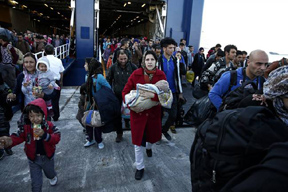
BRUSSELS: As thousands of Syrians, Afghans and others kept up their relentless march through the Balkans, European leaders held an emergency summit to find ways of easing the plight of those caught up in the continent’s greatest immigration crisis in decades.
In a draft of the meeting’s conclusions seen by The Associated Press, the leaders were looking to shore up Greece’s porous border with Turkey and slow the flow of people heading north toward the European Union’s heartland.
“Extraordinary times demand extraordinary measures,” German Chancellor Angela Merkel said of the summit called on short notice that brought 11 leaders from the EU and the Balkans to Brussels.
Serbian Prime Minister Aleksandar Vucic said he was prepared for “hard, not very pleasant” talks, but hoped the leaders could work out a “comprehensive solution.”
He said Serbia would not “put up any walls” unlike Hungary’s new razor wire-topped border fences but suggested his country will not agree to host tens of thousands of stranded refugees if countries further west closed their borders.
Other Balkan officials say the 28-nation EU needs to get control of the migrant flow at the bloc’s external border between EU-member Greece and Turkey.
Migration experts, however, say the flood of refugees won’t be halted until the world resolves the war in Syria, which is driving millions out of the country.
Nearly 250,000 migrants have passed through the Balkans since mid-September and the surge is not being deterred by either cold weather or colder waters off Greece.
Croatia said 11,500 people crossed into the country, the highest in a single day since asylum-seekers were blocked by Hungary and started coming into Croatia in mid-September.
At Slovenia’s overwhelmed Brezice refugee camp near the border with Croatia, a spokesman for the U.N. Refugee agency urged leaders to come up with a system to register and screen newcomers when they first enter Europe, rather than in piecemeal attempts at borders along the way.
“But also very important is to help Syria’s neighboring countries, where there are around 4 million refugees,” said UNHCR spokesman Babar Baloch.
“These people don’t need to take these risky journeys if there are legal pathways to come to Europe.” -AP






